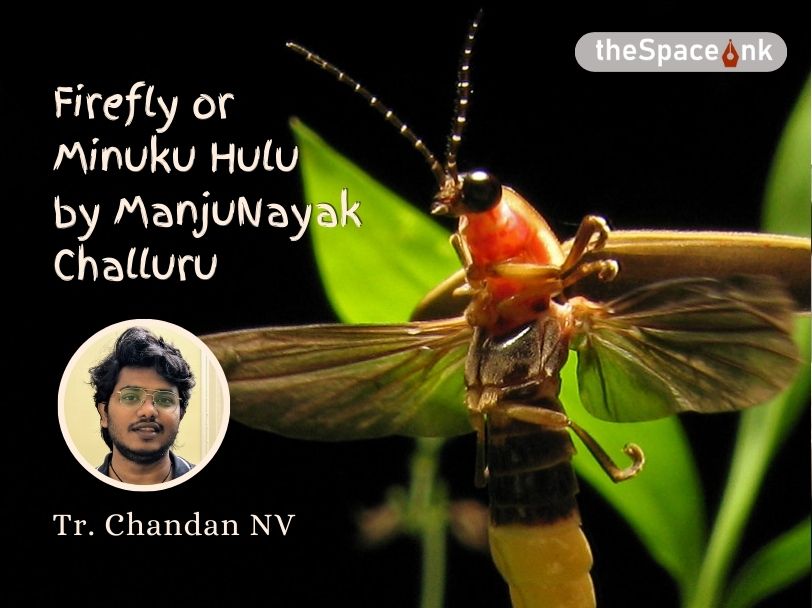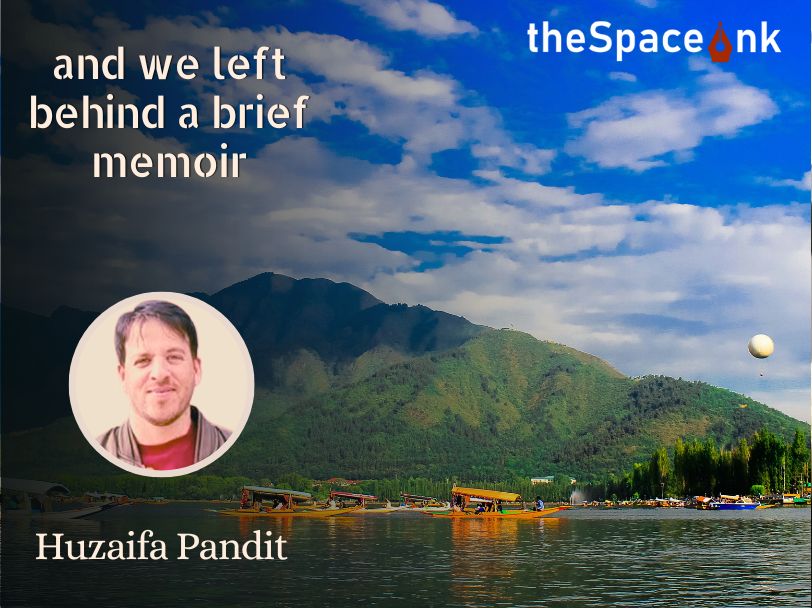Fugitive Words and Illicit Poems
I know Amit as the quietest person in any room. But he is also someone you cannot ignore. Because he has a presence. Like all good storytellers, he observes, alive to the moment, and you can see the scenes in front of him unfolding through his generous heart. Maybe when he is back in the serenity of his home, all what he has seen unfolds slowly but surely into pellucid poetry. Amit is a marvellous poet and a quiet marvel.
He is an award-winning short story writer and poet. He has won the Poiesis Award for Excellence in Literature (2015) and Wordweavers Prize (First prize in Poetry-2011, Short Story-2014), Nissim International Runner-up Prize for Poetry (2019), First Prize in Asylum of Allusions Poetry Contest by Harbinger Asylum Magazine (USA, 2020) amongst other awards. He has also been nominated for the Pushcart Prize, the Griffin Poetry Prize and the Best of Net Anthology. His works have received commendable mentions in Cha ‘Void’ Poetry Contest and Wingword Poetry Contest. He has been a delegate writer at literary events of repute. His works have been included in Best Indian Poetry Anthology 2018. Amit has published three collections of poems and co-edited a collection of short stories. Apart from being a poet and author he juggles the roles of co-founder of Rhythm Divine Poets, Editor-in-Chief of EKL Review, Fiction Editor of Ethos Literary Journal, Chief Executive Editor (Hon.) of Virasat Art Publication and the Assistant Secretary of Intercultural Poetry and Performance Library. He has a PhD in English from The University of Calcutta and teaches as an Assistant Professor in the Department of English at Seacom Skills University.
But beyond everything, is Amit’s influence as a person who gets other poets to bring their best out in the form of soirees, contests, recitals and publications.
It was an absolute pleasure to interact with him for this interview.
Q. When did your journey as a poet start?
A: Poetry is something that a child learns first in the form of rhymes. So I too grew up rhyming words. But I got well appreciated when a poem of mine titled “A Plant” was selected by my English teacher Mr. Steve Menezes and it was published in my school’s wall magazine in 1992. There is an interesting story of how I got my poet persona noticed by my school teachers which is documented here: http://ourecho.com/story-5343-The-Stratagem.shtml. Since 1994 I started writing poetry seriously, first in imitation of the canonical masters, and then developing my own voice in course of time. Some of the early poems were later published in Poetry.com, MuseIndia.com, Boloji.com, Kritya.com etc.
Q. What is it about writing poetry that excites you?
A: Writing poetry has been a part of my life and yet there have been phases when I have not written a poem for a long period of time. In each phase of poetry writing I have perhaps been a different poet. However much I try to emulate the poet who wrote the poems in a particular phase in the past I cannot do so successfully. So it is this constant development that is very exciting. I have to do something new in each phase.
Q. Who are your favourite poets?
A: Among the canonical poets it is John Keats and Samuel Taylor Coleridge. Among contemporary poets whom I am in touch with are Kushal Poddar and Ananya Chatterjee. There are many poets whom I appreciate and that includes Sunil Bhandari but to name just a few will not do justice to all of them.
4. Tell us the story about your first book. And how each of the subsequent ones are different.
A: I got my first book published when I was 39 years old. I had been cogitating about the fact whether I have a good enough number of quality poems to produce a book for quite some time. One late December in 2016 Kiriti Sengupta and Bitan Chakraborty of Hawakal Publishers asked for my manuscript. Every time I collated a manuscript of poems I had a few new poems which I had written in the interim and wanted to include. So the manuscript was revised a number of times until I decided it is enough and sent it to Hawakal in October 2017. It was also a period when I along with Sufia Khatoon and Anindita Bose started Rhythm Divine Poets, a group that works for the promotion of poetry. I came in contact with Ananya Chatterjee whose influence brought the emotional element in my poems and Kushal Poddar whose influence helped me find my own voice distinct from canonical influence. I also started living in Bolpur and many rural metaphors crept into my poems. It was this mix of emotional, aesthetic and social influences that went into the making of my first book “Balconies of Time” which got published in November 2017 by Hawakal Publishers. My second book “Fugitive Words” which was also published by Hawakal Publishers (in June 2019) was a progression of the first but it is more diverse in theme. My third book “Illicit Poems” was born out of a whim. Linda Ashok asked me for a donation for her fundraiser to help victims of Amphan and Covid-19 and I told her that I have my poems to donate. So I compiled a digital chapbook of thirty popular poems of mine and got it published in Pothi. The money raised from the sale of it went to the fundraiser. Later I got the chapbook published in paperback too.
Q. What’s your day job — and how do you reconcile it with your journey as an artist?
A: My day job is that of an Assistant Professor in the Department of English at Seacom Skills University. I especially wanted to do a job where I will be involved with literature because then I will not have to constantly switch on and off my artist persona. But it was a path of struggle as I had to study science at graduate level to satisfy my father and then come back to do Masters and PhD in literature in Calcutta University and then because of this chequered academic background I had to wait till 2016 to get a proper full time job of my choice. Literature for me is not a hobby that I do in my leisure but I live my life as literature so it was necessary that all aspects of it needed to add to that singular goal. But then even Keats had to train as an apothecary before devoting himself to poetry and later in life he acknowledged that he was glad at not having given away his medical books. Perhaps, I too am glad that I did not discard my Mathematics books which help me mix some method in the madness of an artist.
Q. Do tell us about your collective Rhythm Divine Poets and what it stands for.
A: Rhythm Divine Poets is a collective I co-founded with Anindita Bose and Sufia Khatoon.
Early in 2015, barring a few exceptions, the poetry scene was quite uneventful in Kolkata and we felt the need to do something that will bring like-minded people together. Thus was born Rhythm Divine Poets, an endeavour entirely funded by the three of us and dedicated to create a space for poets to showcase their talents. We helped create the so-called “poetry scene” in Kolkata by organizing poetry readings, workshops, festivals and hosting outstation poets visiting Kolkata. We also held the Poetry Chapbook Contest and published works of poets like Huzaifa Pandit and Kripi Malviya. We did 100 Thousand Poets for Change events and the Woman Scream International Poetry and Arts Festival in Kolkata. Many organizations like Alliance Francaise, Intercultural Poetry and Performance Library, Oxford Bookstore and others came in support of us. In a sense Rhythm Divine Poets stands for something germinal that has happened with English poetry in Kolkata.
Q. Do tell us about what is now making massive waves — EKL Review. Where did the idea for this come from? What do you want to achieve from it?
A: If Rhythm Divine Poets is germinal, then EKL Review is its future development that has now come into existence. When we started Rhythm Divine Poets we had decided that we will review its activities after five years and in 2020 when we were thinking of what next, Jagari Mukherjee came with the proposal of starting an online journal. But there are so many existing online journals, how will ours be different? We took inspiration from Leszek Kolakowski’s essay “Emperor Kennedy Legend: A New Anthropological Debate” and decided to imagine against the grain. This will be the next level of activity for us in the field of literature where we will be breaking boundaries and experimenting with forms. The aim of this journal is twofold – to challenge whatever is given and to connect with the world. We devised a very rich register for the journal and made it avant-garde. EKL Review is an evolved organism – something of the order of the monolith that appears in Stanley Kubrick “2001 A Space Odyssey.”
Q. You are a generous soul, always there in events, in collaborations. What is your philosophy of life here?
A: It is a cliché to say “be the change you want to see”. But it is true that if one wants to live in a particular type of house one has to build it. So one needs to cultivate the field in which one wants to prosper and that is what we have done. Anindita, Sufia and I created the urge in the people to belong to the “poetry scene” and thereby not just us but everyone who had the desire has benefitted. The philosophy of my life is to develop and progress not like a palm tree but like a banyan tree.
Q. You stay in Calcutta. How much of your life and art is influenced by that?
A: I stay in Calcutta and am glad that I stay in Calcutta. Every weekend I have to come back to Calcutta from Bolpur because this is the city where I have grown up. The city seeps into my poems unnoticeably. I have written poems on Park Street, Gariahat, Southern Avenue and even Baguiati. So many poets I know now have grown up simultaneously in this same city like in different parts of the same house without knowing each other. And yet we may have crossed each other at some points in time at some avenues in Calcutta. Often I ask poets, especially of my age, what they were doing on a particular day and discover that we may have come physically so close to each other and again separated without knowing. One can imagine living many parallel lives of such coincidences and this imagination is what fuels art.
Poems
Uxbridge or This Frozen English Summer
See how the children run!
Memory freezes a summer
and a day. The moment
doesn’t get tired out
into futility. Nothing
should thaw this summer day
and wash down our children’s
growing up years. Nothing.
This refrigerated summer
memory will not grow up.
It will not pass out of
school and college. It will
stay uneducated. It will
not learn a lesson or
earn a living. It will
stay a pauper. Always.
This summer day, frozen
in time like a crystal,
will blind our eyes one day.
And the lasers of the future
will break the crystal cataracts
into infinite pieces of
memories dispersing in the
aged air, everywhere.
(From “Balconies of Time”)
Ungrasped Love
When I have no words in me
your verses come like the waves
and I feel no longer empty
as they fill up the crevasses.
Our love the wide blue sea,
touching, untouching our feet
with a constant tendency
to meet, to pull and unmeet.
When I write these verses for you
a lamp reflects on the ceiling,
light reflects a thought or two
and the air fills up with feelings.
Our love the grains of sand,
it does not spill out of the grip
for we never closed our hands —
an ungrasped love can never slip.
(From Illicit Poems)
Sunil Bhandari is a poet by compulsion. He says he survives in this world because he can get to write poetry. He says he does all this for his soul; for his body he manages finance of a large conglomerate. He has written the Amazon bestseller book of poetry "of love and other abandonments". His latest book is "Of Journeys & Other Ways To Get Lost". His poetry has appeared in several poetry compilations, including Cologne of Heritage, Discarded, Poerty, Verse of Silence, Hibiscus, etc. He is a popular poet in the Calcutta circle of poets, and has been an invited poet in Apeejay Kolkata Lit Fest, Delhi Poetry Festival and Valley of Words Fest in Dehra Dun. His poetry podcast 'Uncut Poetry' is quite popular.








